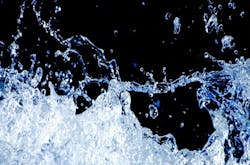Team Develops Method to Destroy Explosives in Wastewater
A pair of University of Delaware environmental engineering professors and a UD engineering alumnus have teamed up to test technology using iron nanoparticles in order to clean wastewater from munitions processing and demilitarization.
Using a three year grant from the U.S. Department of Defense (DOD), professors Pei Chiu and Daniel Cha are working with Brian Hubbard, environmental, safety and occupational health officer with the U.S. Army, to break down explosives in wastewater, reported the University of Delaware. Several students are also participating in the project.
The grant began in 2019 and comes from DOD’s Environmental Security Technology Certification Program (ESTCP).
The goal of this project is to develop and implement new treatment technologies for wastewater containing insensitive munitions compounds, according to the University of Delaware.
Since the military is producing insensitive munitions, which are more difficult to set off than TNT, for example, these materials dissolve easily in water used in manufacturing processes, ultimately appearing in water at higher concentrations.
“Processes such as manufacturing often generate wastewater, but what if that water could be treated and reused?” said Chiu. “Army operations could save water and money and reduce risks at the same time.”
Microscopic iron particles, nanoscale zerovalent iron, are being used to treat this water, according to the research team.
The team collected wastewater samples from Army facilities and performed water quality and munitions compound analyses. This was achieved using high-performance liquid chromatography with a diode-array detector. Once iron nanoparticles destroy the munitions compounds in the wastewater, the team adds hydrogen peroxide to oxidize the residues to harmless byproducts.
Field-scale pilot testing will begin in spring 2020, according to the team.
The team suspects that the technology could be applicable for treatment of industrial wastewater from industries other than the military, such as agrichemicals and consumer product manufacturing.
The team submitted a provisional patent disclosure in 2019, added the University.
